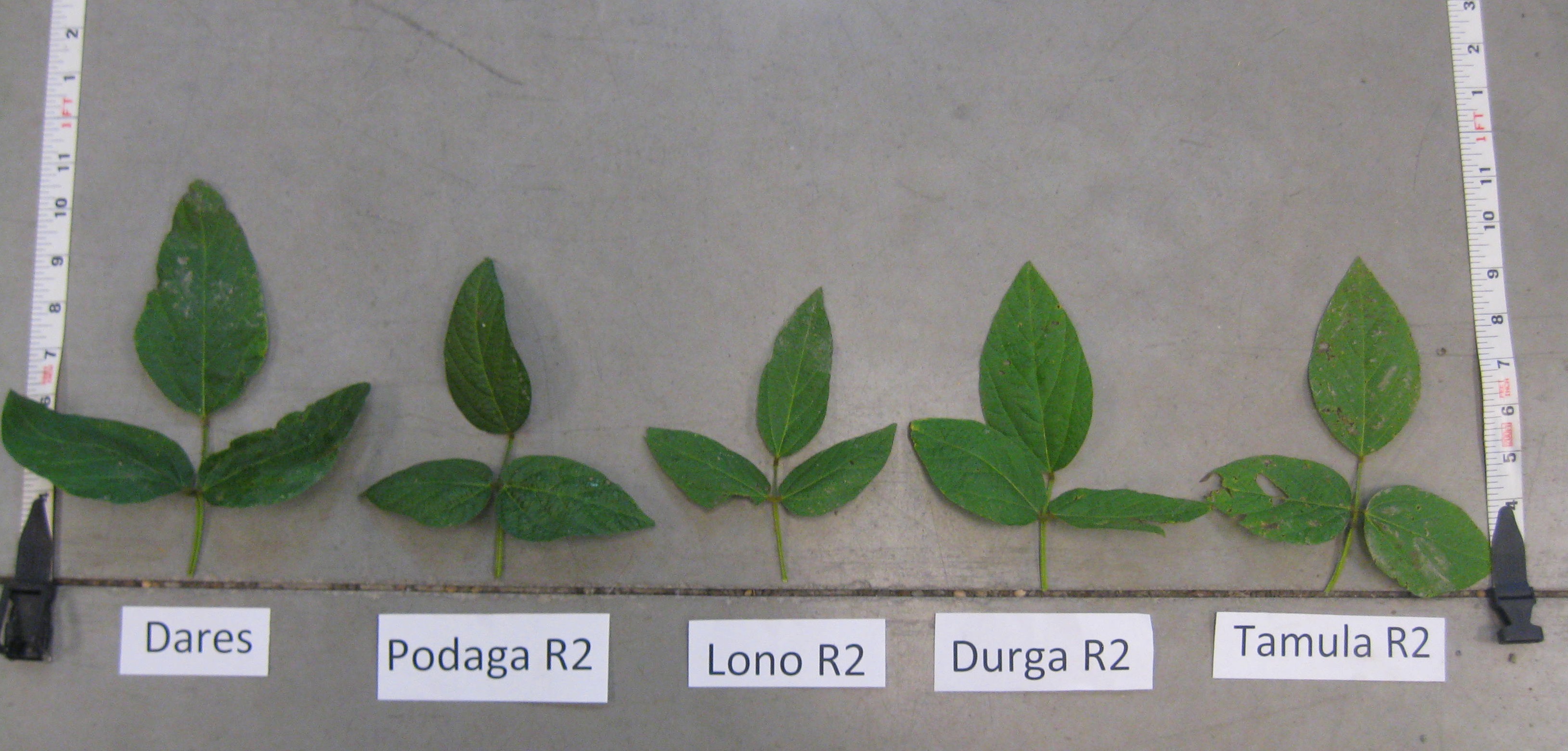Tamula R2
| Denomination: | 'Tamula R2' |
|---|---|
| Previously Proposed Denomination: | 'C4M14021 R2' |
| Botanical Name: | Glycine max |
| Applicant/Holder: |
Sollio Agriculture 19235, avenue Saint-Louis Saint-Hyacinthe, Quebec J2T 5J4 Canada |
| Breeder: |
Jérôme Auclair, La Coop fédérée, Saint-Hyacinthe, Quebec |
| Application Date: | 2015-06-23 |
| Provisional Protection:: | 2015-06-23 |
| Application Number: | 15-8677 |
| Grant of Rights Date: | 2019-02-18 |
| Certificate Number: | 5922 |
| Date rights surrendered: | 2022-01-17 |
Variety Description
Varieties used for comparison: 'Lono R2' and 'Dares'
Summary: The plants of 'Tamula R2' begin flowering very early to early while the plants of 'Dares' begin flowering mid to late season. The lateral leaflet of 'Tamula R2' is medium sized whereas it is small for 'Lono R2'. When 50% of the pods are ripe, the plants of 'Tamula R2' are taller than those of 'Lono R2' and shorter than those of 'Dares'. 'Tamula R2' has a light to medium brown pod colour whereas the pod is dark brown for 'Dares'. The plants of 'Tamula R2' are earlier maturing than those of 'Dares'.
Description:
PLANT: oilseed type, indeterminate growth type, erect to semi-erect branch attitude, tawny pubescence on middle third of main stem, begins flowering very early to early in season, matures very early to early
HYPOCOTYL: medium intensity of anthocyanin colouration
LEAF: light to medium green colour, medium degree of blistering, pointed ovate lateral leaflet, medium sized lateral leaflet
FLOWER: violet
POD: light to medium intensity of brown colour
SEED: spherical flattened shape, yellow ground colour of testa
HILUM: yellow, yellow funicle
Origin & Breeding History: 'Tamula R2' (experimental designation C4M14021 R2) is the result of a cross between proprietary selections conducted in 2008 by La Coop fédérée, in Rancagua, Chile. A modified single seed descent method was used to develop the variety. In 2008 and 2010, the F1-F4 generations were grown in Santa Isabel, Puerto Rico. In 2011, plants from the F5 generation, grown in Saint-Hyacinthe, Québec, were selected based on a visual assessment of lodging resistance, the number of pods per plant, and early maturation. The selected line was compared with the other sister lines within the recombinant family, which were derived from single seed descent. 'Tamula R2' was tested in the public trials of the Manitoba Crop Variety Evaluation Trials and the Western Manitoba Soybean Adaptation Trial in 2016 and 2017.
Tests & Trials: The comparative trials for 'Tamula R2' were conducted during the 2016 and 2017 growing seasons in field site Techno 5 at La Coop fédérée, in Saint-Hyacinthe, Quebec. Each trial consisted of 3 replications per variety distributed in a RCB design and covering a plot size of 7.5 square metres. Each replicate consisted of four 5 metre long rows spaced 0.38 metres apart. The seeding density was such that it resulted in a total of over 750 plants per variety for each trial. For each variety, the plant height was based on 20 measurements in 2016 and 30 measurements in 2017. Mean differences were significant at the 5% probability level based on LSD values.
Comparison tables for 'Tamula R2' with reference varieties 'Lono R2' and 'Dares'
Plant height (cm)
| 'Tamula R2' | 'Lono R2' | 'Dares' | |
|---|---|---|---|
| mean 2016 (LSD=5.51) | 81.7 | 77.6 | 96.2 |
| std. deviation (2016) | 3.17 | 4.01 | 5.49 |
| mean 2017 (LSD=1.96) | 81.7 | 78.4 | 93.1 |
| std. deviation 2017 | 2.6 | 3.11 | 2.83 |
Days to maturity
| 'Tamula R2' | 'Lono R2' | 'Dares' | |
|---|---|---|---|
| mean 2016 | 114 | 114 | 131 |
| mean 2017 | 118 | 118 | 132 |
Click on image for larger view

Soybean: 'Tamula R2' (furthest right) with reference varieties 'Dares' (furthest left) and 'Lono R2' (centre)
- Date modified: